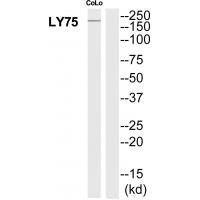
| WB | 咨询技术 | Human,Mouse,Rat |
| IF | 咨询技术 | Human,Mouse,Rat |
| IHC | 咨询技术 | Human,Mouse,Rat |
| ICC | 技术咨询 | Human,Mouse,Rat |
| FCM | 咨询技术 | Human,Mouse,Rat |
| Elisa | 咨询技术 | Human,Mouse,Rat |
| Aliases | C-type lectin domain family 13 member B; CD205; CLEC13B; DEC-205; gp200-MR6 |
| Entrez GeneID | 100526664;4065; |
| WB Predicted band size | 199kDa |
| Host/Isotype | Rabbit IgG |
| Antibody Type | Primary antibody |
| Storage | Store at 4°C short term. Aliquot and store at -20°C long term. Avoid freeze/thaw cycles. |
| Species Reactivity | Human |
| Immunogen | Synthesized peptide derived from Internal of human LY75. |
| Formulation | Purified antibody in PBS with 0.05% sodium azide. |
+ +
以下是关于LY75(DEC-205/CD205)抗体的3篇文献信息及摘要概括:
1. **文献名称**:*Targeting antigens to dendritic cells via DEC-205*
**作者**:Hawiger D, et al.
**摘要**:研究探讨了利用抗DEC-205(LY75)抗体将抗原靶向递送至树突状细胞(DCs)的策略。结果表明,该抗体偶联抗原后可显著增强DCs的抗原呈递能力,并诱导特异性T细胞免疫应答,为疫苗开发提供新思路。
2. **文献名称**:*DEC-205: a guide to antigen processing and presentation in dendritic cells*
**作者**:Jiang W, et al.
**摘要**:本文综述了DEC-205(LY75)在树突状细胞抗原摄取、加工及呈递中的分子机制,强调其作为C型凝集素受体的功能,并讨论了其抗体在增强交叉呈递中的潜在应用。
3. **文献名称**:*Anti-DEC-205 monoclonal antibody fused to human immunodeficiency virus type 1 antigen modulates antigen-specific responses but does not enhance viral suppression*
**作者**:Cheong C, et al.
**摘要**:研究评估了抗DEC-205抗体与HIV-1抗原融合蛋白的免疫效果,发现其虽能激活DCs并诱导抗原特异性T细胞反应,但在动物模型中未能显著抑制病毒载量,提示需进一步优化靶向策略。
(注:若需更多文献,可结合具体研究方向在PubMed或Google Scholar中检索关键词“LY75 antibody”或“DEC-205 targeting”。)
LY75 antibody targets the LY75 protein, also known as DEC-205 or CD205. a type C lectin receptor belonging to the macrophage mannose receptor family. Primarily expressed on antigen-presenting cells (APCs), such as dendritic cells, macrophages, and B cells, LY75 plays a critical role in antigen capture, processing, and presentation to T cells. Its structure includes multiple cytoplasmic domains and leucine-rich repeats, enabling efficient endocytosis and routing of antigens to MHC class II compartments for immune activation.
LY75 is a key player in bridging innate and adaptive immunity. Research highlights its potential as a therapeutic target in cancer immunotherapy, where antibodies against LY75 are engineered to deliver tumor-specific antigens or conjugated drugs directly to APCs, enhancing antigen-specific immune responses. Additionally, LY75 antibodies are utilized in studying autoimmune diseases and infectious diseases, given their role in modulating immune tolerance and pathogen recognition.
In experimental settings, LY75 antibodies serve as tools to track dendritic cell subsets, analyze antigen-processing pathways, or block receptor-ligand interactions. Their clinical relevance is underscored by ongoing studies exploring LY75-targeted vaccines for cancers and chronic infections. However, challenges remain in optimizing specificity and minimizing off-target effects. Overall, LY75 antibodies represent a promising avenue for understanding immune regulation and developing precision immunotherapies.
×